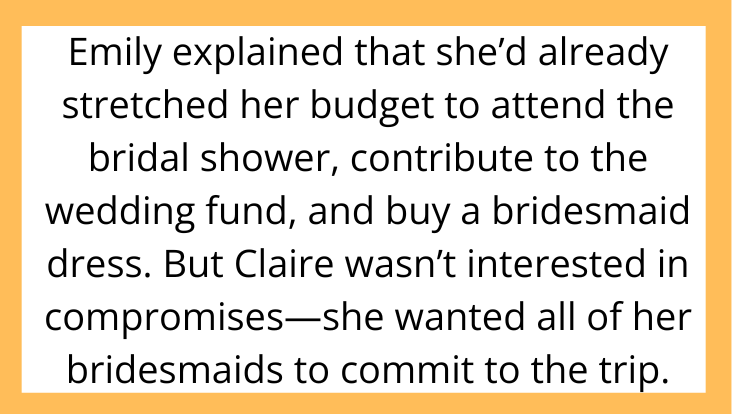AITAH for Refusing to Pay for My Best Friend’s Bachelorette Trip Because I’m Saving for a House?
When lifelong friendships collide with big financial expectations, emotions can run high. Today’s AITAH scenario dives into a heated fallout between two best friends over a pricey bachelorette trip—and whether declining to foot the bill makes you a bad friend.
Let’s look at what happened and who, if anyone, is truly at fault.
The Backstory: A Dream Bachelorette in Mexico

The original poster—let’s call her Emily—shared her story on r/AITAH. Emily, 28, has been best friends with Claire, 29, since middle school. They’ve been through everything together: teenage heartbreaks, first jobs, and now, Claire’s upcoming wedding.
Claire recently announced she wanted her bachelorette party to be an unforgettable four-day trip to Tulum, Mexico. The plan included luxury beachfront accommodation, spa treatments, yacht excursions, and nightly dinners at upscale restaurants. Total cost per person? Around $2,500, not including flights.
Emily, who makes a modest salary as a junior designer, immediately knew she couldn’t swing it. She’s been saving every penny for a down payment on her first home, and she told Claire she’d be happy to attend a local celebration instead but simply couldn’t afford to travel abroad.
Claire’s reaction shocked her.
The Fallout: Accusations and Hurt Feelings

According to Emily, Claire called her “selfish,” “unsupportive,” and accused her of caring more about money than their friendship.
“You know how much this wedding means to me,” Claire said. “You can always save for a house later. This is once in a lifetime.”
Emily explained that she’d already stretched her budget to attend the bridal shower, contribute to the wedding fund, and buy a bridesmaid dress. But Claire wasn’t interested in compromises—she wanted all of her bridesmaids to commit to the trip.
When Emily stood firm, Claire stopped speaking to her. Mutual friends began messaging Emily, pressuring her to “just put it on a credit card” and reminding her she was “letting everyone down.”
Feeling conflicted, Emily turned to Reddit for judgment: Was she the villain for refusing to pay for an expensive bachelorette trip?
The Community Verdict: Is Emily the Villain?

Reddit’s AITAH community overwhelmingly sided with Emily.
Why Emily Is Not the Villain
-
Boundaries Matter: No one should be pressured to go into debt for someone else’s celebration.
-
Priorities Are Personal: Saving for a house is a major milestone and a responsible goal.
-
Friendship Isn’t Measured by Money: Attending every expensive event isn’t proof of loyalty.
One commenter put it bluntly:
“A real friend wouldn’t guilt-trip you into spending thousands of dollars you don’t have.”
Others noted that bachelorette parties have become “unreasonably extravagant” and that not everyone can—or should—be expected to participate.
The Other Side: Why Claire Felt Hurt

While most commenters sympathized with Emily, a few could see why Claire was upset:
-
High Expectations: Claire had envisioned her dream trip with all her closest friends by her side.
-
Group Dynamics: Having one person drop out can impact logistics and costs for everyone else.
-
Emotional Investment: Weddings are a major life event, and emotions often run high.
Still, even those who empathized with Claire agreed that calling Emily selfish was unfair.
The Bigger Issue: When Celebrations Become a Burden

This AITAH scenario taps into a common problem: the rise of high-cost wedding events that put financial strain on friends and family.
Many people feel obligated to say yes to every event out of fear of looking unsupportive, even when it means going into debt. But the truth is:
-
You are allowed to say no.
-
You don’t owe anyone an explanation beyond “I can’t afford it.”
-
True friends respect financial boundaries.
No amount of guilt-tripping or peer pressure makes it okay to expect others to compromise their financial stability.
Setting Boundaries Without Losing Friendships

If you find yourself in a similar situation, here are a few ways to navigate it gracefully:
-
Be Clear and Honest Early
As soon as you know you can’t afford something, speak up. Waiting too long can lead to misunderstandings. -
Offer Alternatives
Suggest participating in local celebrations or helping in other ways (planning, decorating, etc.). -
Stick to Your Decision
Once you’ve set your boundary, don’t waver because of guilt. You don’t have to justify protecting your finances. -
Stay Kind
Avoid accusatory language, even if the other person lashes out.
The Takeaway: Saying No Doesn’t Make You a Bad Friend

Emily’s story is a reminder that caring for your future is not selfish. Weddings are important milestones—but they shouldn’t overshadow basic financial well-being.
You can love your friend and still say no. You can celebrate their happiness in ways that don’t jeopardize your own stability.
And if someone can’t understand that, the problem isn’t you.



